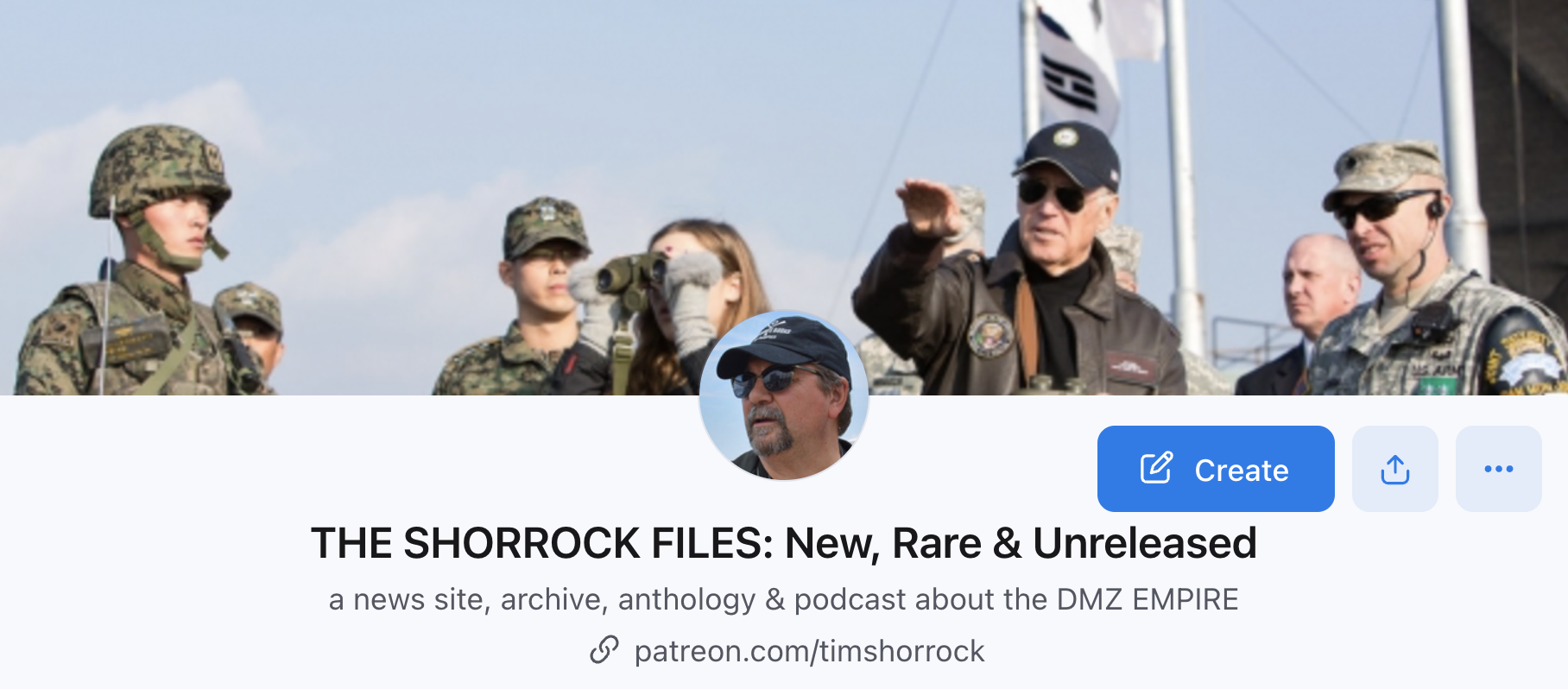George Meany, Henry Kissinger, and the Cover-up of an American’s Murder in Chile in 1973
“As every cell in Chile will tell/The cries of the tortured men/Remember Allende and the days before/Before the army came/Please remember Victor Jara in the Santiago Stadium/Es verdad, those Washington bullets again.” (The Clash, Sandinista, 1980)
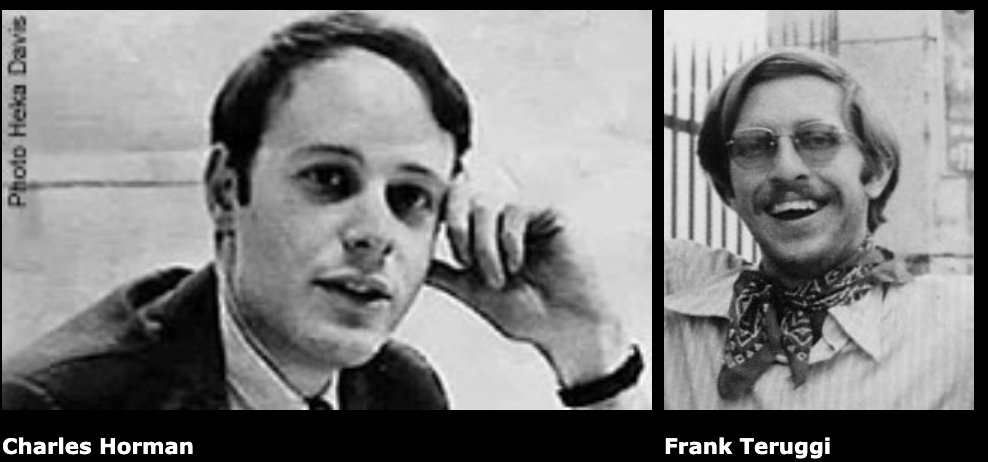
One of the most memorable characters in the great Costa-Gavras film Missing is Frank Teruggi, one of Charles Horman’s activist friends who was murdered, along with Horman, by the Chilean military in the Santiago Stadium in the days after the horrific coup against Salvador Allende on September 11, 1973. Much of the film focuses on Horman’s father (played by Jack Lemmon) as as he and Charles’ wife (Sissy Spacek) try to find what happened to the two men after they were picked up by Chilean security during the coup. Throughout, they have to listen to the pathetic excuses by US diplomats and military attaches as they seek to explain away the disappearances of the two men and play down the American role in the military takeover by General Augusto Pinochet.
Today, I am publishing for the first time a series of letters between Teruggi’s father, Frank Terruggi Sr., a member of the AFL-CIO’s Chicago Typographical Union, to AFL-CIO President George Meany about the death of his son. I obtained these letters from the AFL-CIO’s archives while preparing my 2003 investigation for The Nation about the role of the labor federation in the Nixon administration’s plans to topple the Allende government and end his brief experiment in democratic socialism. I’m releasing these documents on the 50th anniversary of the coup in in the hopes that the AFL-CIO – which I belonged to for many years as a union member – will finally apologize for its role in this debacle.
As I confirmed in my story about the AFL-CIO’s archives, “From 1971 to 1973, the AFL-CIO’s American Institute for Free Labor Development (AIFLD), one of four US-government-funded labor institutes created during the cold war, channeled millions of dollars to right-wing unions and political parties opposed to Allende’s socialist agenda. That aid helped finance the revolt by Chile’s professional class and fanned the flames of social unrest that provided the pretext for Gen. Augusto Pinochet’s violent crackdown and the justification for his seventeen-year dictatorship.”
At the end of my account, I wrote this.
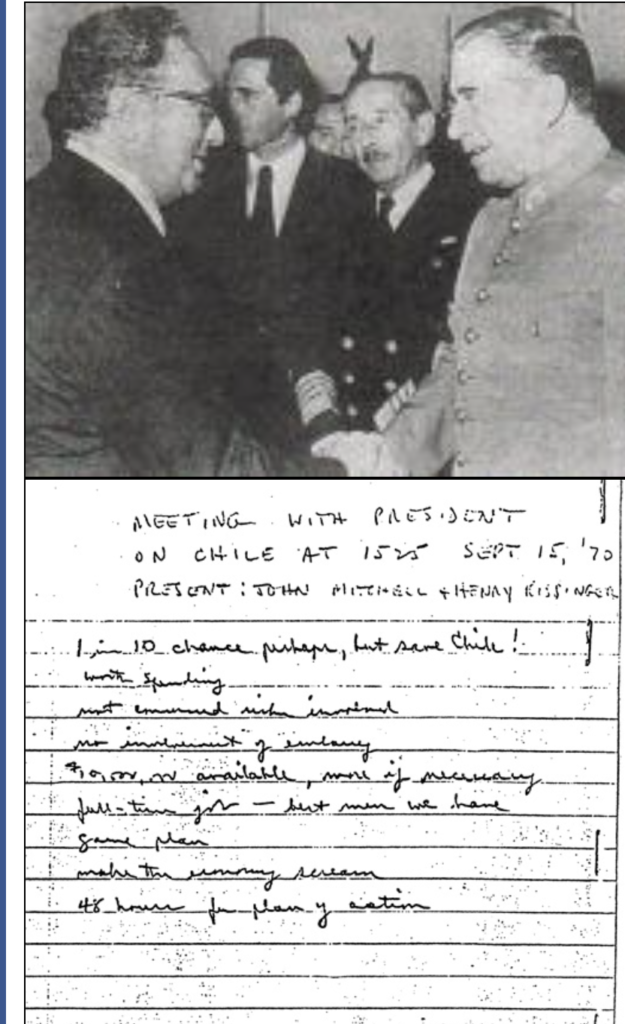
One of the saddest things about the Chile files is the absence of any statement condemning Pinochet’s coup. The AFL-CIO’s indifference comes across in Meany’s response to an October 3, 1973, telegram from Patrick Gorman, then president of the Amalgamated Meat Cutters International Union, beseeching him to protest the pending execution of Luis Corvalan, one of Chile’s leading Communists and a prominent member of the CUT [labor federation]. “A trade union leader in Chile could, with the present reactionary progress of the world, be a trade union leader of the United States tomorrow,” Gorman wrote. But Meany ignored the message: At the top of the cable appears a handwritten note by Ernest Lee, his son-in-law and director of international affairs: “No response.”
The correspondence between Terruggi’s father and Meany is just as sad, and reveals the labor’s leader’s cold indifference to the suffering he had partly caused.
Frank Teruggi Sr. first went to Chile to investigate the death of his son in February 1974, The Progressive reported in this moving profile in 2014.
Frank Teruggi Sr. joined a delegation that went to Chile from February 16 to 23, 1974. The group was called The Chicago Commission of Inquiry into the Status of Human Rights in Chile. It included U.E. Vice President Ernie DeMaio, Chicago Alder Anna Langford, and the Reverend James Reed as well as Joanne Fox Przeworski who had recently worked as a doctoral student in Chile.
They visited the embassy where, according to Fox-Przeworski, “It was a whitewash kind of a meeting, explaining that the embassy couldn’t really do anything for us, that they were trying by all means to help the Teruggi family, etc. . . . We later learned that they did know much more than they were telling us.”
The Commission’s report was excerpted and printed in the New York Review of Books on May 30, 1974. Point eleven in the “Summary of Findings” states: “The Embassy of the United States seems to have made no serious efforts to protect the American citizens present in Chile during and after the military takeover.”
During the trip, Frank Teruggi, Sr. met with Ambassador David Popper, who had been assigned to Chile after the coup. A declassified report of their February 18 conversation includes an exchange where Frank Teruggi, Sr. says to Ambassador Popper: “It is difficult for [my] family to understand how the U.S. Government can be helping the Government of Chile when they don’t even answer our questions.”
Eventually, the killers were found.
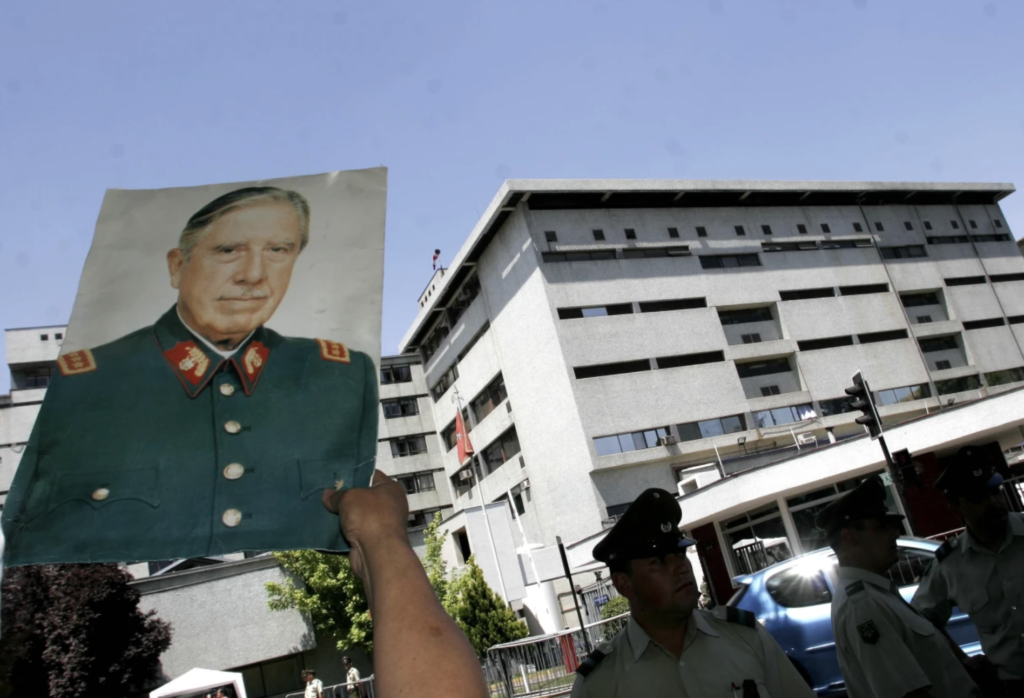
In 2015, two former Chilean intelligence officials were convicted as accomplices in the murders of Teruggi and Horman. The Chilean court said that the crimes were also the result of information passed to Chilean intelligence by. the United States Military Group in Santiago. In 2016, they were sentenced; one of the agents got 15 years, his accomplice received only a two-year probation sentence.
According to The New York Times, “When he was killed, Mr. Horman, 31, a filmmaker and journalist, had been living in Chile with his wife, Joyce, researching a political murder and writing scripts for the state-run Chile Films. Mr. Teruggi, 24, a graduate of the California Institute of Technology, was studying economics and collaborated in a weekly news digest. The Horman case inspired the award-winning 1982 Costa-Gavras film Missing.”
Chilean intelligence officials considered the men’s activities subversive and ordered their detention, the sentence says. The decision to kill Mr. Horman, it concludes, was made by the Intelligence Department of Chile’s Joint Chiefs of Staff and “carried out by the Military Intelligence Batallion or the Army Intelligence Headquarters.” Mr. Teruggi was taken to the National Stadium in Santiago and was tortured and apparently killed there.
The ruling said both crimes were the result of a “secret investigation” of Americans’ political activities in Chile by the United States Military Group in Santiago, commanded by a Navy captain, Ray E. Davis. The information was passed on to Chilean officials. In 2011, Mr. Davis was indicted, and Chile requested his extradition from the United States, where he was thought to be living. But Mr. Davis had been admitted to a nursing home in Chile, and he died there in 2013.
Mr. Teruggi’s sister, Janis Teruggi Page, said, “Frank, a charitable and peace-loving young man, was the victim of a calculated crime by the Chilean military, but the question of U.S. complicity remains yet to be answered.” Each victim’s family was awarded $325,000 in damages.
It took years of investigation and perseverence by the Terrugi and Horman families to find the truth. “Evidence gathered by the National Security Archive and published by Peter Kornbluh in his comprehensive volume “The Pinochet File: A Declassified Dossier on Atrocity and Accountability” now confirms that Frank and his roommate, another FIN member, David Hathaway, were taken from their home at 9:00pm on September 20, questioned at a nearby Carabineros station and then delivered to the national stadium, which had become a holding tank, torture chamber and execution site for thousands of activists and others simply caught up in the frenzy of coup,” The Progressive concluded.
But in the period after the coup, George Meany and his AFL-CIO basically did nothing for them. And when asked to asssist by Frank Teruggi Sr., and his union, Meany asked for help from none other than Henry Kissinger, who had chaired the infamous “40 Committee” that worked with the Central Intelligence Agency to help plan the coup. Here’s how it went down in the documents I discovered.
DOCUMENTS ON THE DEATH OF FRANK TERUGGI JR. FROM THE AFL-CIO ARCHIVES (some of the documents appear in the links in the titles)
1973: Resolution on the tragic death of Frank Teruggi Jr. from the International Typographical Union.
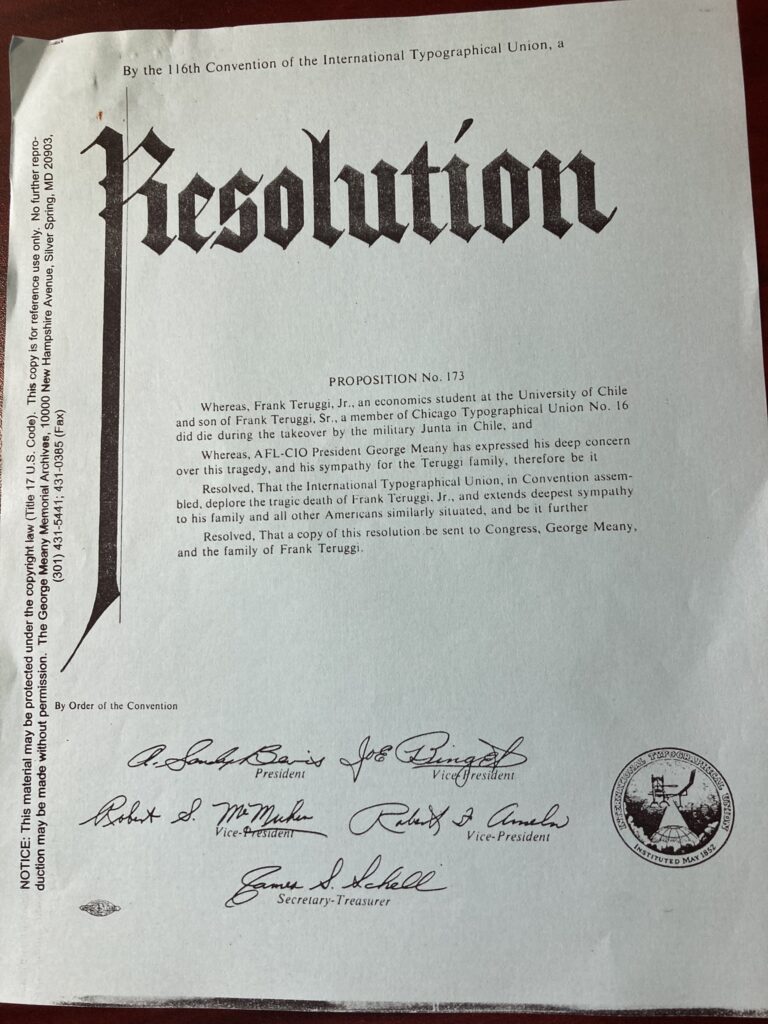
April 8, 1974: Letter from Frank Teruggi Sr. to George Meany, with attachment of resolution from Chicago Typographical Union No. 16.
“I have been given the same answer (from the State Department) over and over – that he was arrested for violating curfew on September 20 and released on September 21. That he was probably killed by sniper fire on the street. I know that this is not true. I’m enclosing a copy of a letter written by the young man that was arrested with my son.”
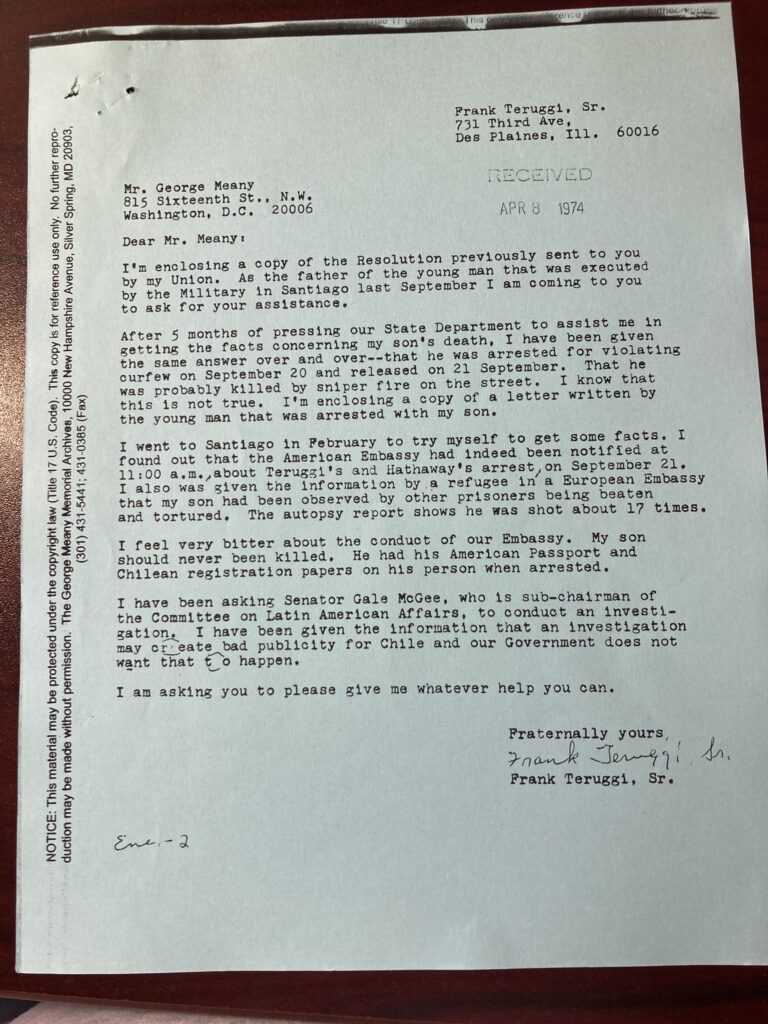
April 8, 1974: Letter dated 01/23/1974 to the State Department and the Teruggi and Horman families from David Hathaway, who was arrested with Frank Jr. on September 20, 1973.
“We were taken to the National Stadium that same night, and informally interrogated (separately) by an Army Officer. The officer told me he believed Frank was a member of a leftist policy party…and Frank subsequently told me that the officer had not told him the same thing about me, nor had Frank told the officer he belonged to any party. Frank was taken from the cell were we were beiong held at approximately 18:00 on September 21, and I never saw him alive again.”
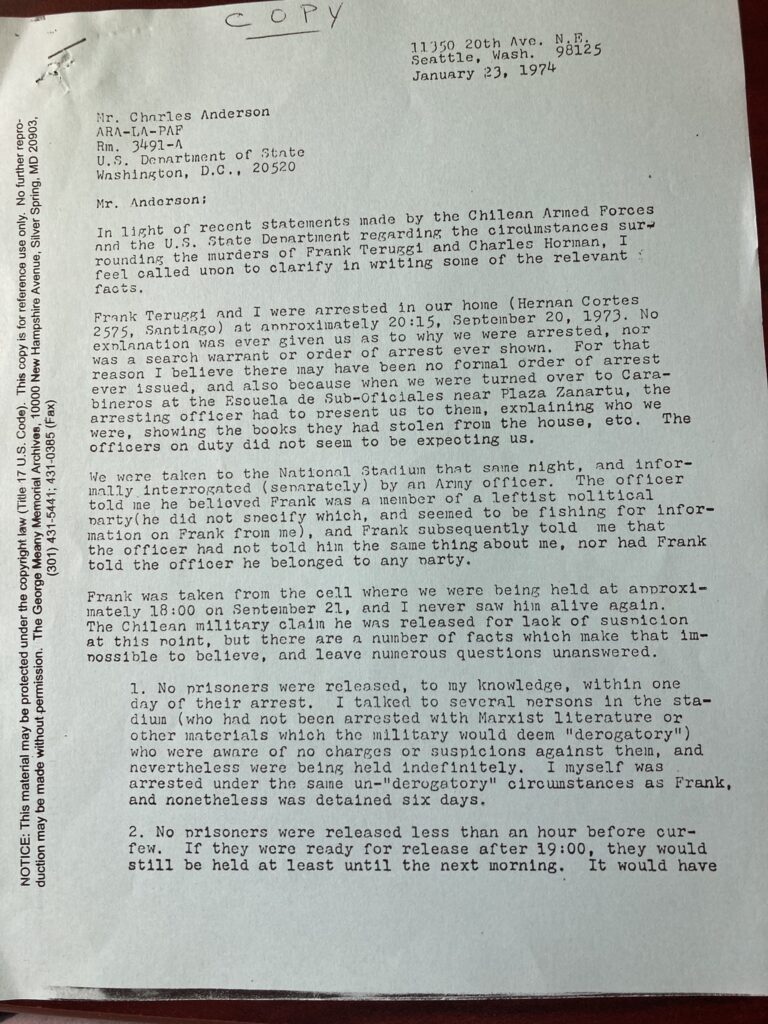
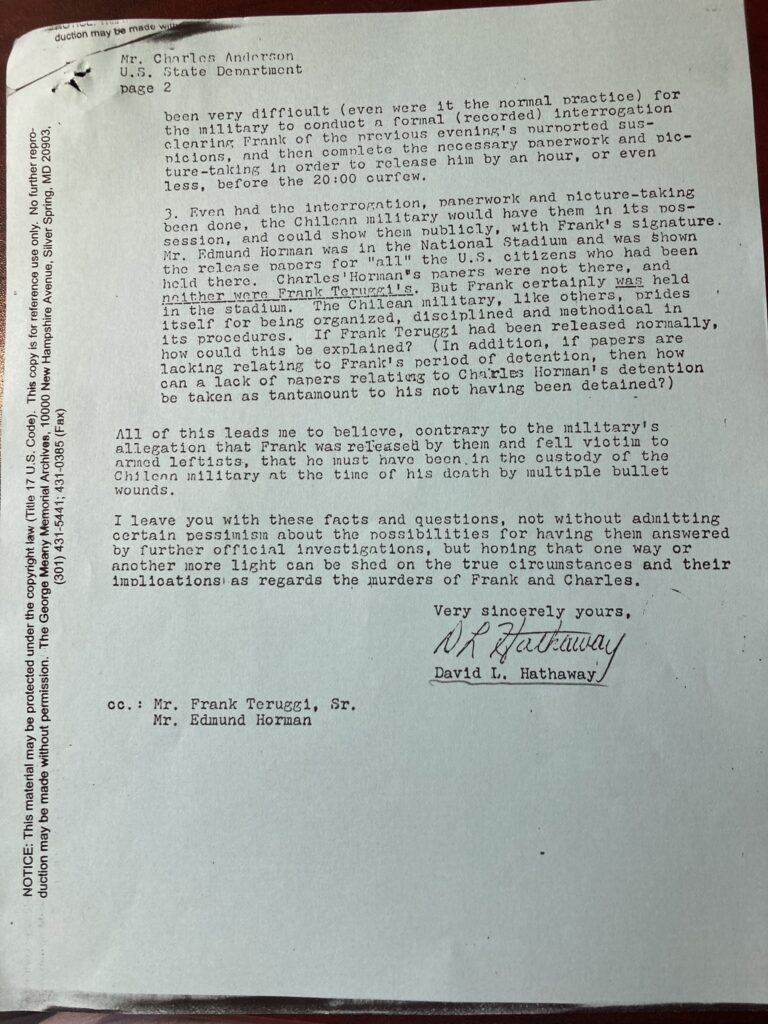
April 9, 1974: Letter from George Meany to Frank Teruggi Sr.
“Of course you must know that I am saddened not only by the tragedy but by your own personal anguish. Accordingly, today I have wrotten to Secretary of State Kissinger asking that the fact of the matter be discussed with ypou in the hope that this entire matter can be clarified to your satisfaction.”
Kissinger, as Meany and his advisers well knew, had helped to plan the coup. Worse, by the time of this letter, the State Department and the FBI had in their position many documents and reports about both Charles Horman and Frank Teruggi Jr.’s political activities in Chile compiled by US intelligence agents. Many of these letters were obtained and published by the National Security Archive in 2011.
April 9, 1974: Letter from George Meany to Henry Kissinger
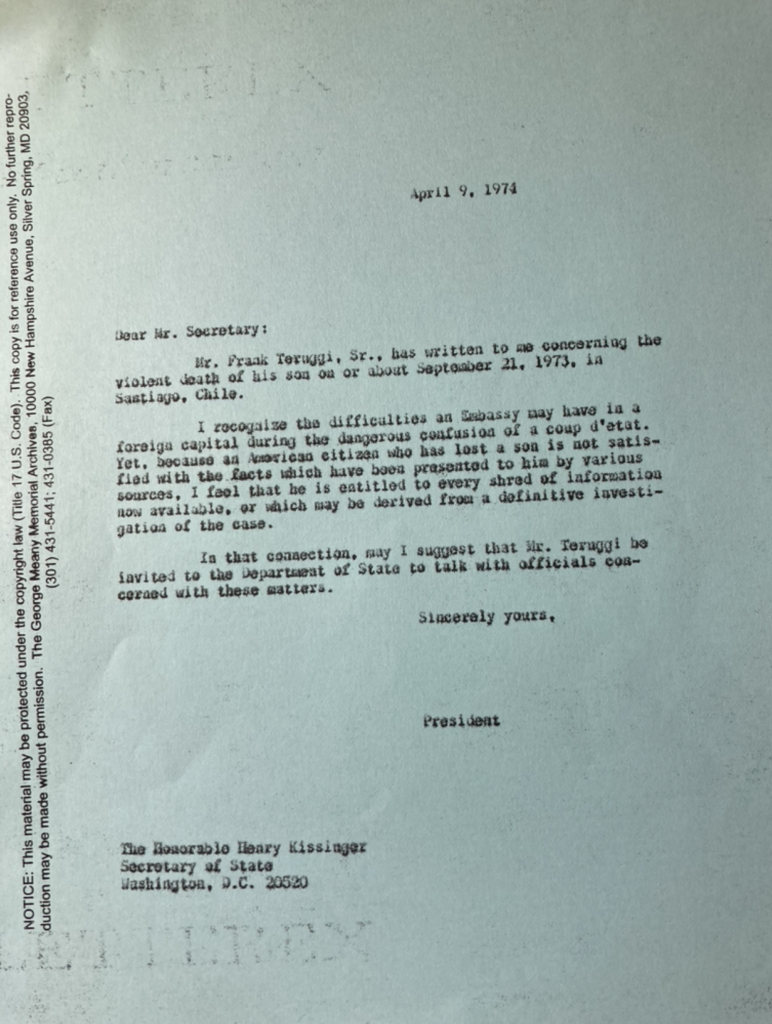
April 15, 1974: Letter to Frank Teruggi, Sr., from David J. Kalke, a family friend.
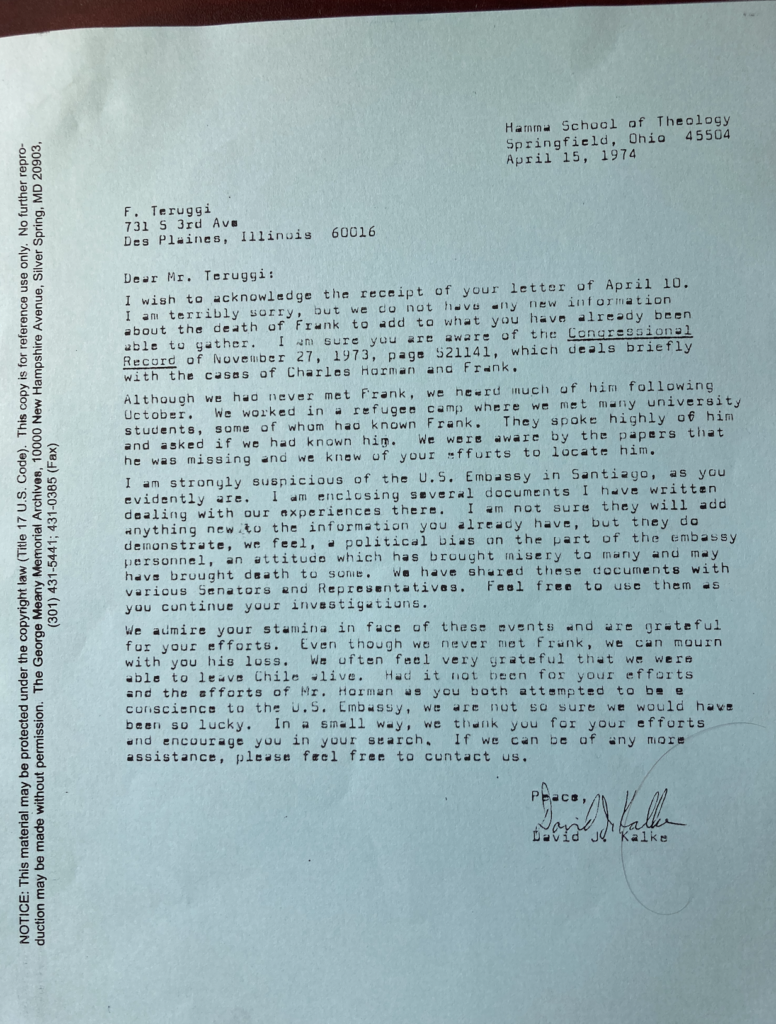
May 3, 1974: Letter to George Meany from Kenneth Rush, Acting Secretary of State, forwarded to Frank Teruggi Sr.
“Be assured that the Department and our Embassy in Santiago have sought through every practical means to clarify the circumstance of the death of Frank Teruggi, Jr. These efforts, unfortunately, have proved unavailing, but we intend to follow closely any further developments in the case.”
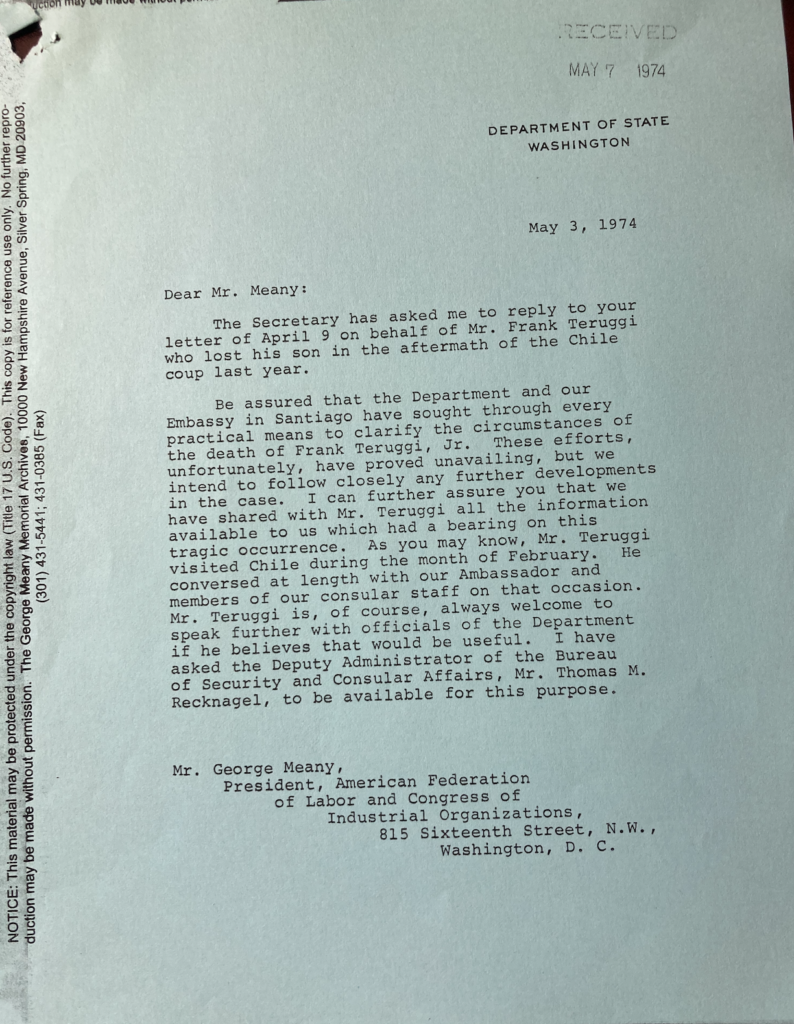
May 11, 1974: Letter to George Meany from Frank Teruggi Sr.
“I must say that I believe no concerted effort was really made to find out what happened to my son. It is possible that Mr. Purdy [of the State Department] has more information than has been given to me. He refused to let me examine the file concerning my son. The excuse was that the file contained classified information. This remark is very difficult for me to understand.
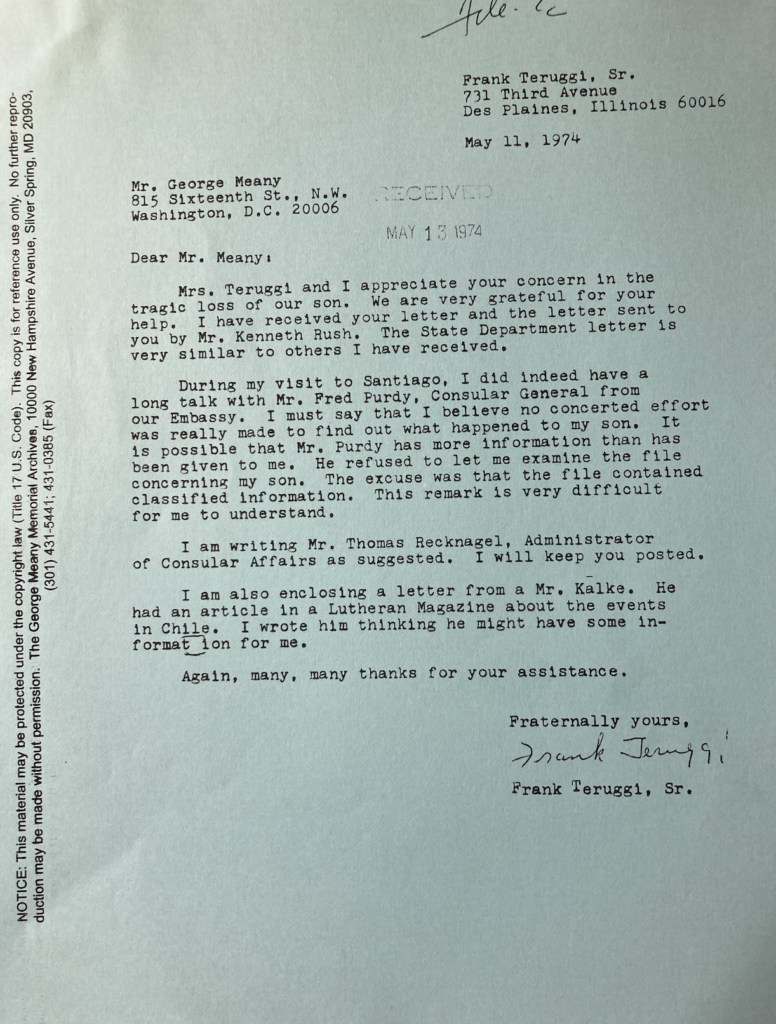
May 24, 1974: Letter to Frank Teruggi Sr. from Thomas M. Recknagel, Department of State
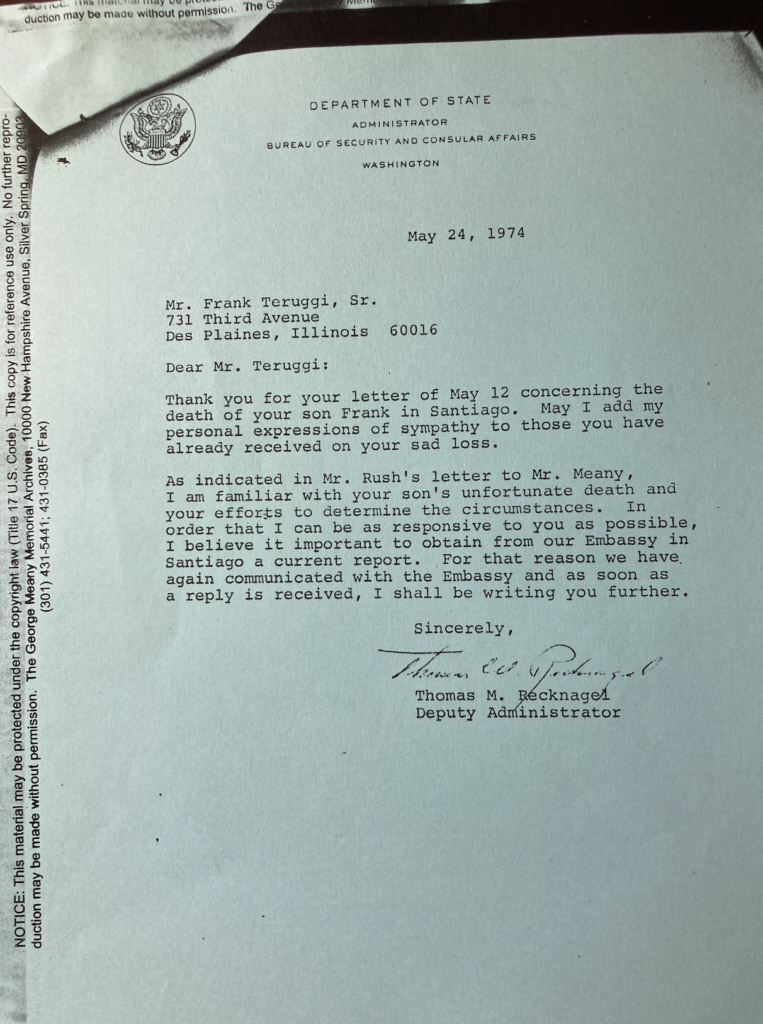
May 30, 1974: Letter to George Meany from Frank Teruggi Sr.
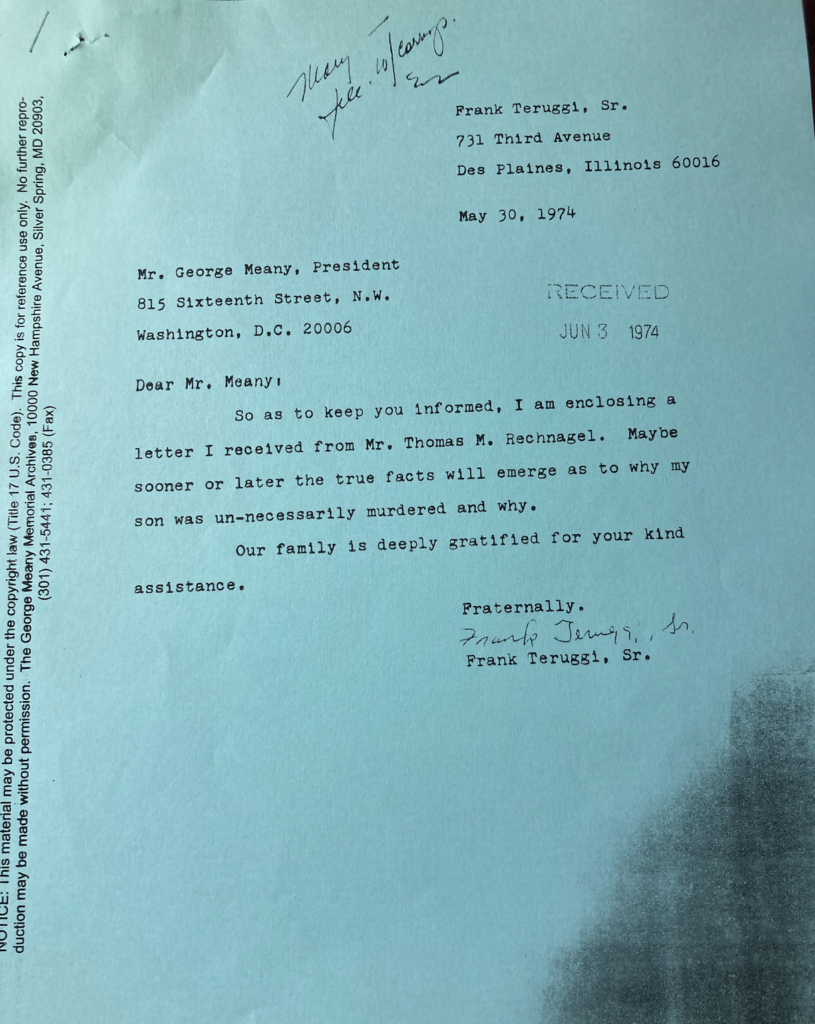
June 24, 1974: Letter from Republic of Chile Government Junta to David H. Popper, US Ambassador
“I take the liberty of reminding Your Excellency that at the time of Mr. Teruggi’s unfortunate death, the country was experiencing a civil war, and many persons, both foreigners and Chilean, were arrested as a security measure. During those days of conflict, the action of snipers caused innumerable casualties, not only among Armed Forces personnel but also many civilians, who comprised the group of innocent bystanders uselessly sacrificed by the actions of the extremists.”
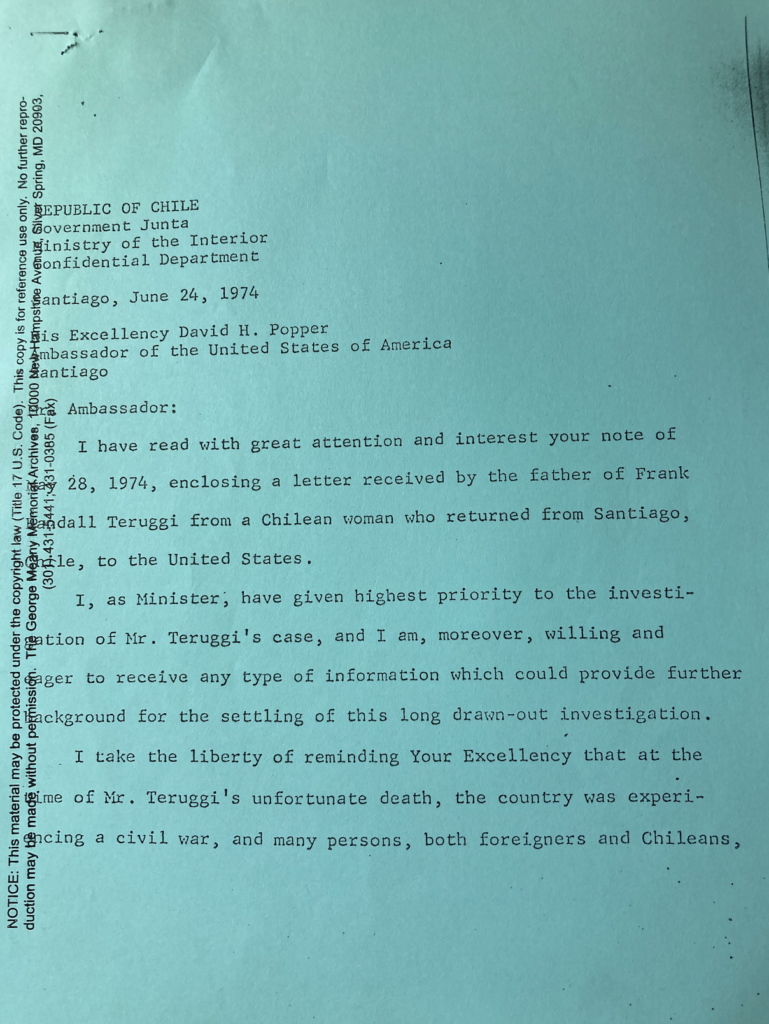
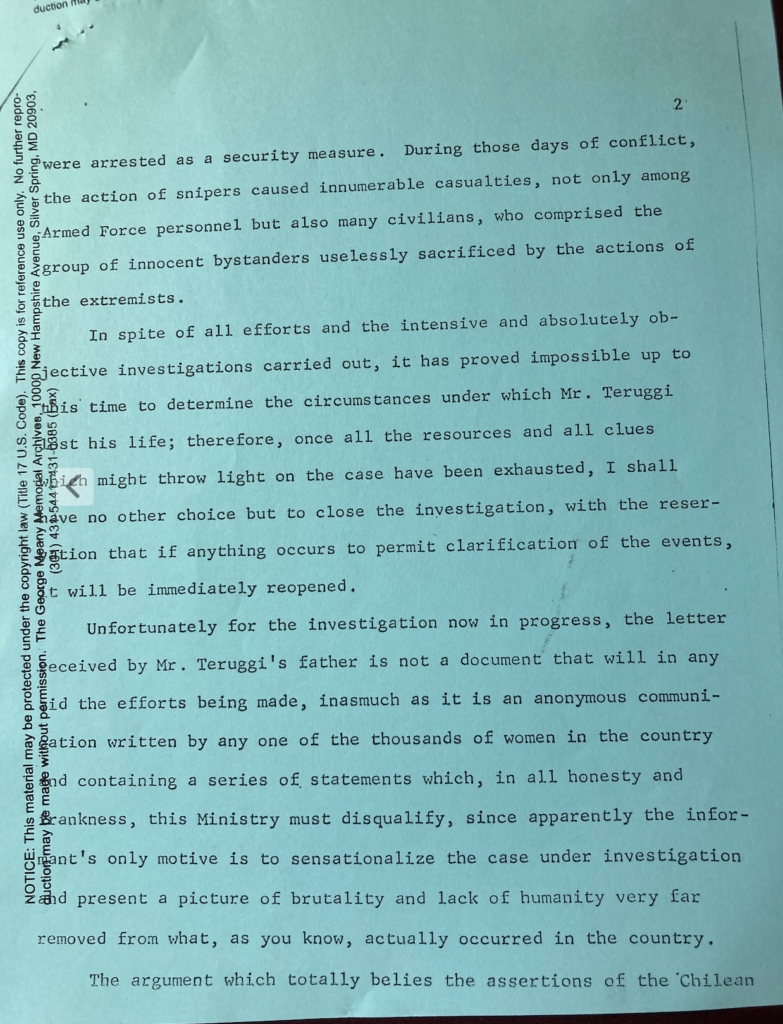
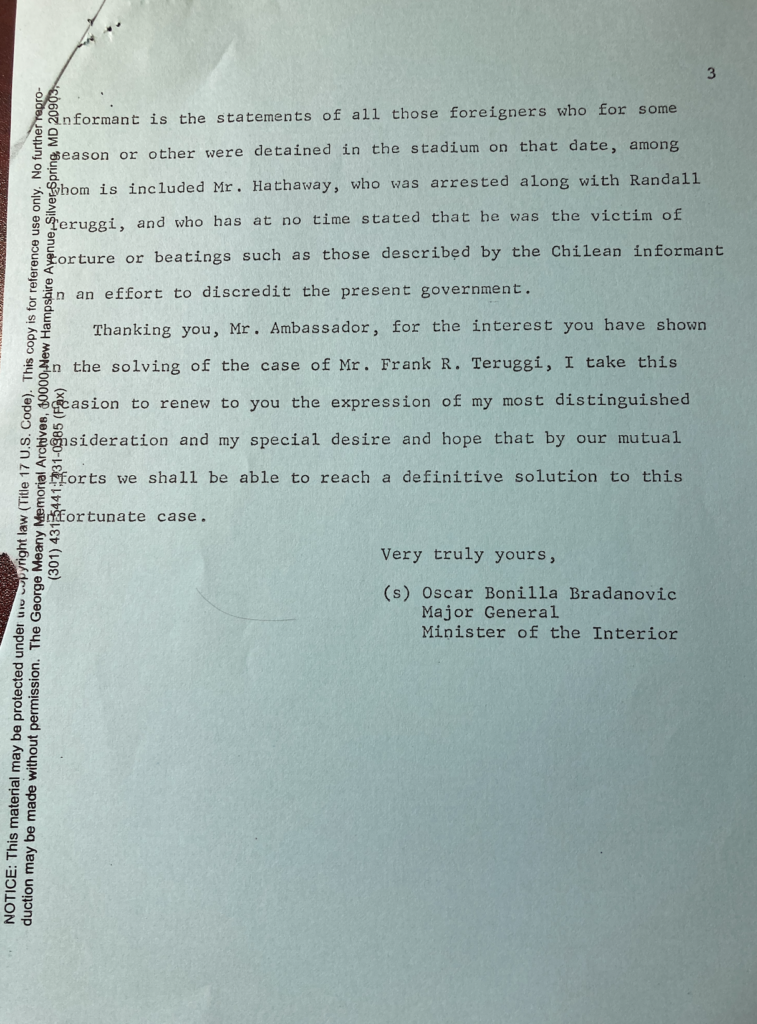
July 24, 1974: Letter to George Meany from Frank Teruggi Sr., concerning his meeting with Thomas Recknagal of State about a document received from the Government of Chile.
“Truthfully, Mr. Meany, I believe they [in Chile] really know that happened to Frank Jr., but as the State Dept. has said previously, “The Chilean Military is not going to admit that they killed your son.” I can’t help but believe that when the trouble started last Sept. 11 in Chile, if our Government had acted more firmly, my son would be alive today, especially when the American Embassy was notified at about 11:00 AM on September 21 that Frank had been arrested the night before.”
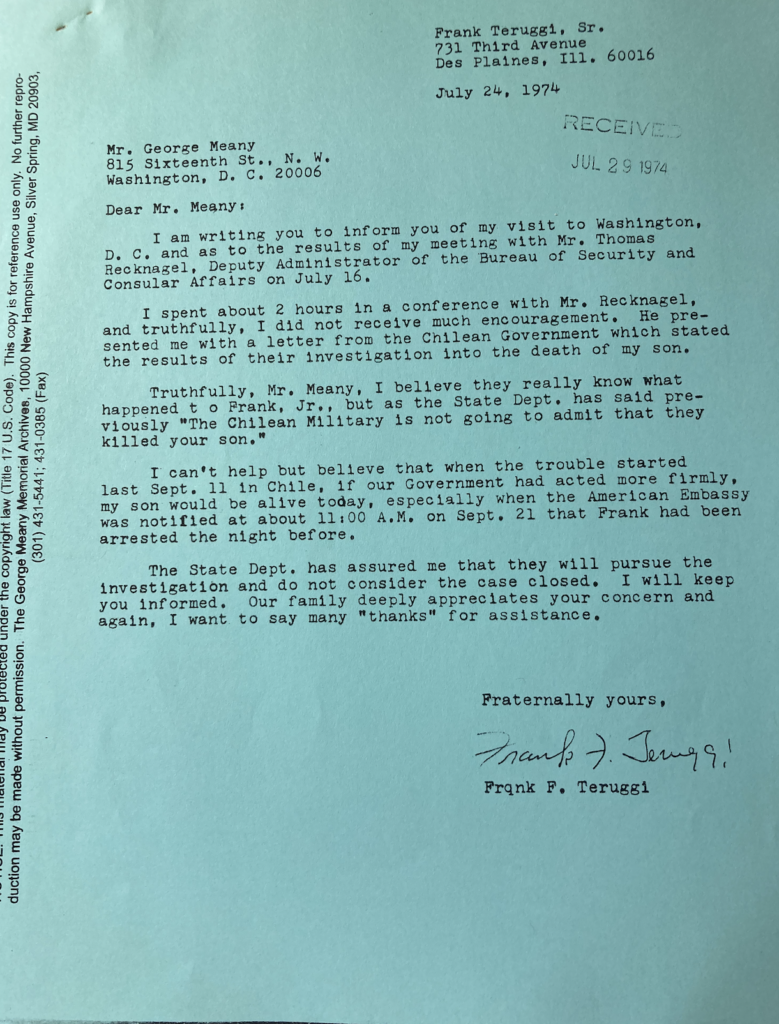
That’s where the correspondence ends.
Frank Teruggi’s body was discovered at a Santiago morgue by a friend in late September 1973. I’ll close with Norman Stockwell’s account in The Progressive:
A confidential diplomatic cable, released by Wikileaks, sent September 26 at 3 p.m. from the US Embassy in Santiago to the Secretary of State in Washington, DC and signed by Ambassador Nathaniel Davis requests contact information for Frank’s next-of-kin and states that the “body must be taken out of Chile in 48 hours.”
The family was finally notified on October 3, but the body was not shipped home until about two weeks latter. The Des Plaines Herald reported that the family was billed $850 in shipping fees to get Frank’s body back, and these had to be paid in advance.
Frank Randall Teruggi was buried in a cemetery in Des Plaines, Illinois. Frank’s sister Janis recalls that she “and his closest friends each placed a red rose on his casket. There were large bouquets of red roses at his wake and funeral. Afterwards my parents took them to the Carmelite Monastery in Des Plaines and the nuns dried the petals and made a rosary from them, which I now have.”
According to newspaper reports at the time, more than 100 friends and family members attended, and the late South African exiled activist poet Dennis Brutus wrote this poem on the occasion:
FOR FRANK TERUGGI (Killed in Chile, Buried in Chicago)
Dennis Brutus, in The Progressive.
A simple rose
a single candle
a black coffin
a few mourners
weeping;
for the unsung brave
who sing in the dark
who defy the colonels
and who know
a new world stirs.
Frank Teruggi, Presente!
Frank Teruggi, Presente!
For more on the Chilean coup of 1973 and the US role, see KISSINGER AND CHILE: THE DECLASSIFIED RECORD from the National Security Archive.
